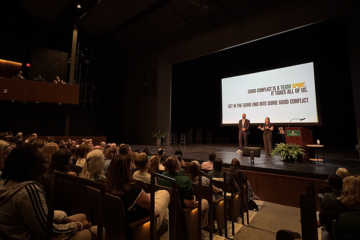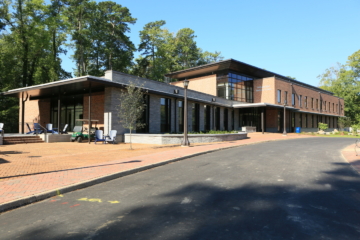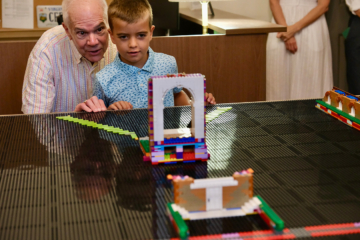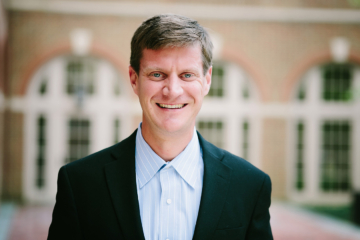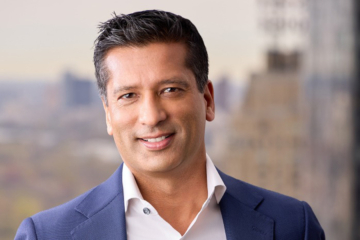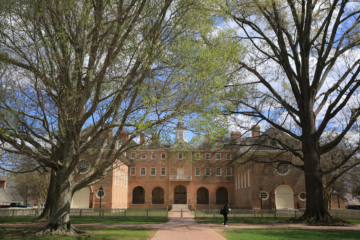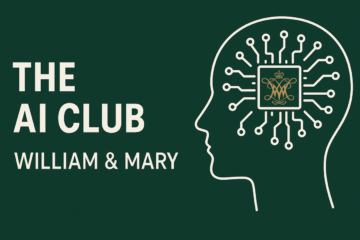Conflict as a catalyst for growth: W&M’s 2025 Professional Development Days
Conflict is nothing new — not in the world, not at William & Mary. In fact, there was a time when it wouldn’t be unusual to see dueling swordsmen on campus.
“It wasn’t something that came after a conflict got bigger and bigger and blew up. It was actually this sort of knee-jerk reaction to the smallest of slights,” said Phil Wagner, clinical associate professor in the Raymond A. Mason School of Business.
“And we are left to wonder, have we come that far, or are we still guilty of seeing conflict as this big, scary war that must come at the end of a lot of escalation? We’re not so sure. What we are sure of is that it is important for us to spend some time talking about this big idea of conflict.”
On Aug. 12 and 13, that’s just what faculty and staff at William & Mary did as part of the university’s Professional Development Days. Launched last year, the effort arose from the Vision 2026’s Democracy Initiative, which seeks to promote the ideals that make pluralistic democracies strong. Last year, the event invited employees to engage in the Aspen Institute’s Better Arguments program, which is taught to all incoming undergraduates. This year, the event focused on managing conflict.
“As we prepare for a new academic year — one in which our students will be actively engaged in learning — it is equally important that we equip ourselves with tools and resources to grow as supportive and effective members of the Tribe,” said Carlane Pittman-Hampton, chief of staff and chair of the Professional Development Days committee.
“This year’s theme emerged from conversations with the ombuds team, who noted a growing sense of frustration surrounding conflict on campus. In response, and as a natural extension of the Better Arguments framework we explored last year, we felt that focusing on conflict resolution was both timely and relevant.”
Nearly 1,300 people participated in this year’s event, which took place in Phi Beta Kappa Memorial Hall. Each day offered the same program, which included remarks from President Katherine A. Rowe, Dean of University Libraries Carrie Cooper, Senior Vice President for Student Affairs & Public Safety Ginger Ambler, W&M Law School Dean A. Benjamin Spencer and Chancellor Professor Emeritus of Education and University Ombuds Rick Gressard plus a dynamic and interactive presentation by Wagner and Emily Gerst, director of conflict resolution and education.
“Conflict matters because we spend a long time — decades — together,” said Rowe. “In higher education, we build long-term relationships. So handling conflict well turns out to be one of the most important skills we have as an organization.”
Noting that her mother’s career focused on negotiation theory, Rowe said she learned to see conflict as a path to growth.
“If it’s handled well, if you can respect it — respect that there are deep interests, passions, values that animate it — you and your organization can grow,” she said.
Appreciating conflict
Ambler and Cooper, who co-chair the Democracy Initiative, reflected on the things William & Mary has done to encourage strategies for responding to conflict, including workshops, book groups and presentations.
“Today, we look forward to exploring what it looks like to engage conflict in healthy ways, keeping in mind our commitment to take winning off the table, to prioritize relationships, to pay attention to context, to embrace vulnerability and to be open to transformation,” said Ambler.
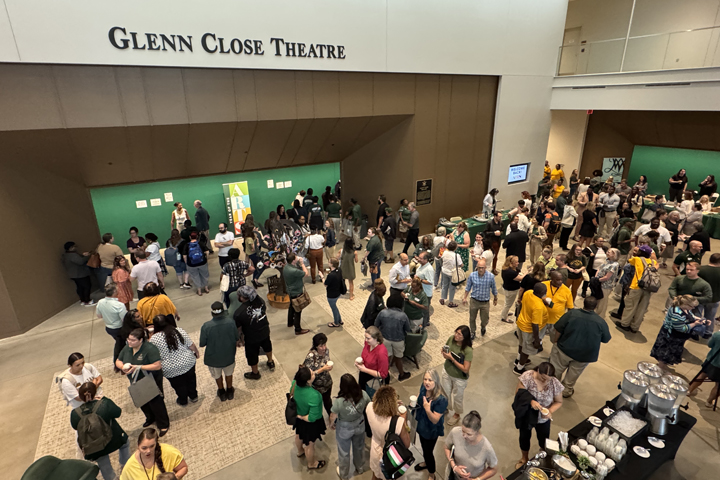
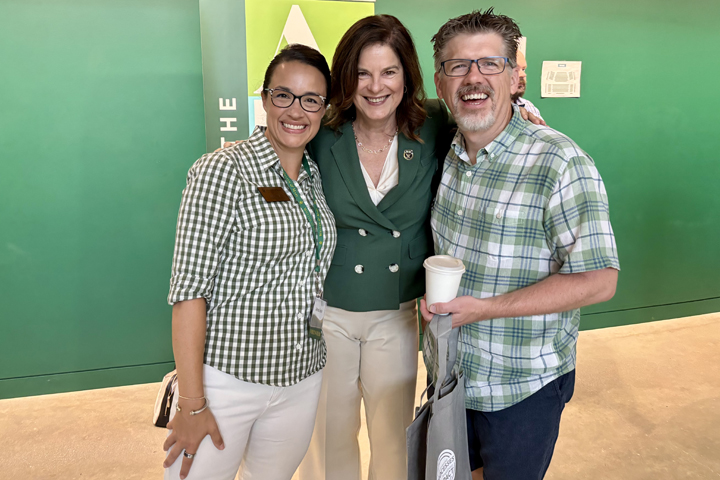
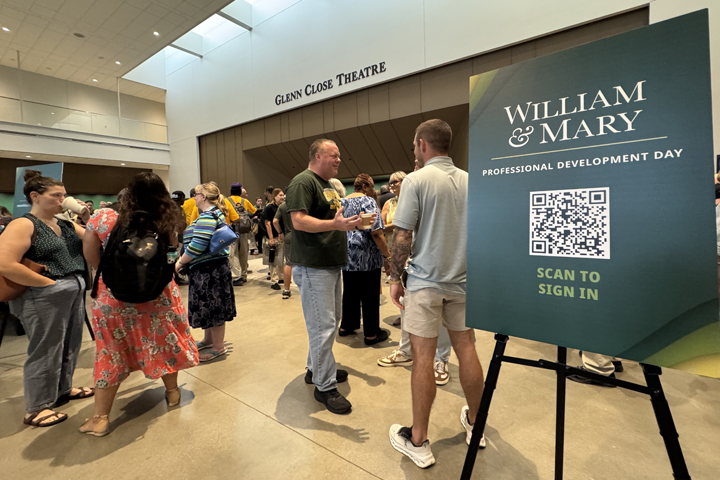
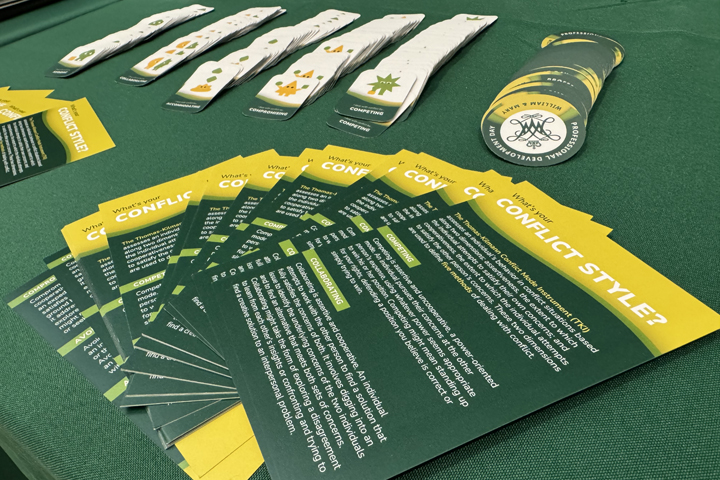
Navigating conflict takes skill and practice, and is a necessary part of life and growth, said Cooper. When it’s done well, there are benefits for work culture and individuals.
“Today, we are developing appreciation for conflict in our lives, being more self-aware of our conflict style, learning how to move through it and knowing where to turn for help at work,” she said.
Joking that he wasn’t sure why a lawyer would be asked to discuss conflict, Spencer helped define the term and discussed options for resolution.
“Conflict resolution is the process of addressing disagreements in ways that minimize destructive outcomes while maximizing opportunities for growth, understanding and improved relationships,” he said. “It’s both an outcome — conflicts get resolved — and a process — the methods we use to achieve that outcome.”
Spencer said it was important to focus on shared interests and not positions.
“Focus on your true priorities and real interests,” he said. “You don’t need to die on every hill. Learn to let some things go. It will be better for your professional relationships and your physical and mental health.”
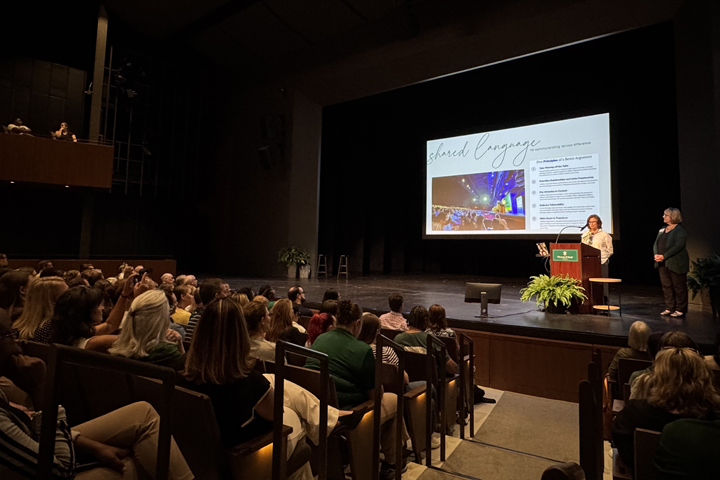
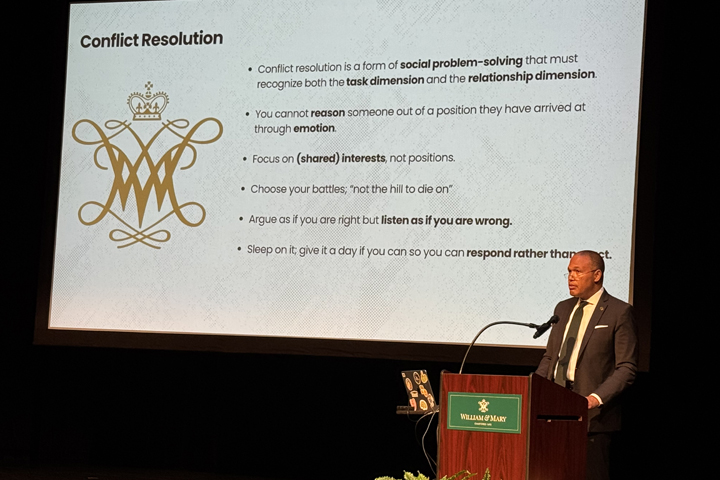
Solve problems, not people
Prior to attending the event, participants were asked to take a quiz to help identify their conflict style from five options: competing, collaborating, accommodating, avoiding and compromising. They were also asked to pick three words to describe how William & Mary handles conflict.
During their presentation, Wagner and Gerst revealed that most of those words had to do with avoidance.
“I think this invites us to consider that we as a community need to rethink the way that we think about conflict,” said Gerst.
Gerst and Wagner hoped participants would come to see it as something “good, helpful and transformational.” They asked participants to reflect on their own experiences and discussed the five conflict styles, noting that collaborating was the most common result among participants.
“We don’t want to moralize any of these,” said Wagner. “They’re not good nor bad, but in situations of conflict, a lot of the tools that get us to an effective place are collaborative in nature, and this style tends to drive us to what we see as a really healthy, effective communication style. It’s what we would call radical candor.”
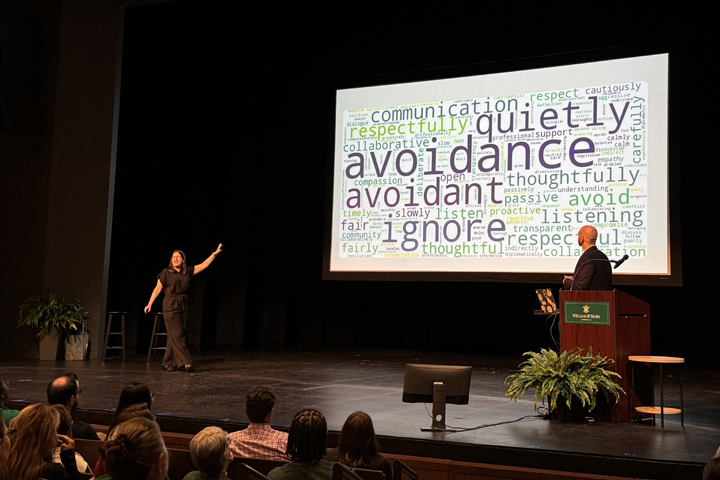
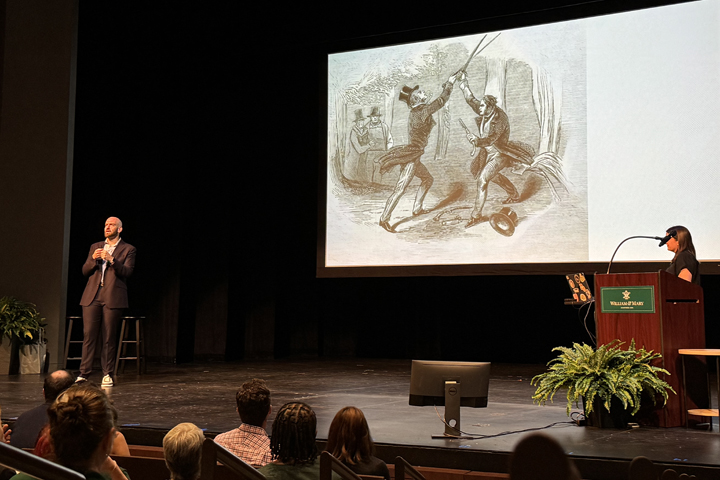
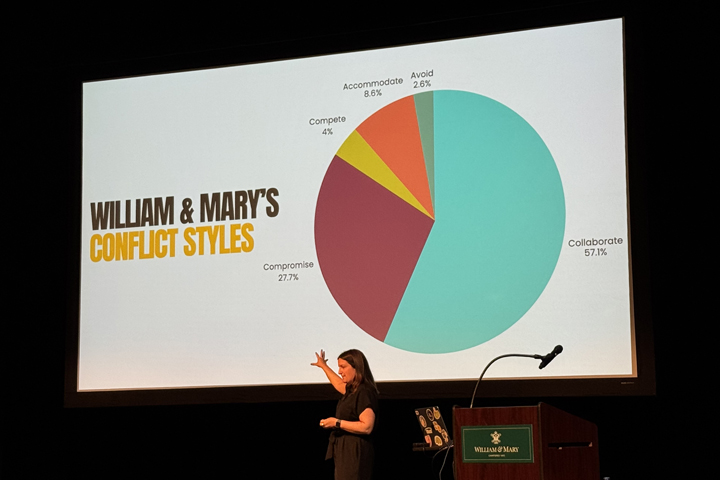
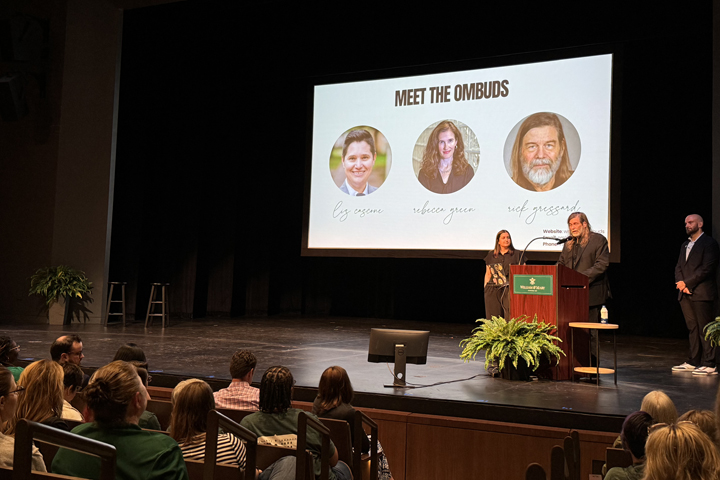
To give participants practical skills, Gerst and Wagner talked about how to raise an issue quickly and kindly, and how to deal with emotions and defensiveness. They also discussed focusing on solving problems themselves instead of seeing people as the problem.
“When you come at someone like they are the problem, you are pulling their attention away from the very real things in our lives that we can change and we often do,” said Gerst.
In concluding their presentation, Wagner and Gerst mentioned additional opportunities for participants to expand their conflict resolution skills. William & Mary Libraries has curated a collection of audio and ebooks related to leadership and conflict, and in September, librarians will host a “Difficult Conversations” book club. In addition, employees always have access to the University Ombuds office.
“Don’t stop the conversation here. Walk and talk. Continue to make new friends and have new conversations. Our ask is that you’ll go pick up your sword,” Wagner joked. “That’s not our ask, but we do want you to pick up the tools that you put in your toolkit today and continue using them.”
“The invitation is to think about good conflict as a team sport,” added Gerst. “If we’re a group of people who want to be collaborators, we have to be in it together.”
Latest W&M News
- Student Health Center continues exceptional student care with AAAHC reaccreditationAAAHC accreditation, held by only seven universities in Virginia, recognizes the university's commitment to providing exceptional student-centered care.
- Brick by brick: W&M community to build model of its Historic CampusWilliam & Mary has launched a yearlong project to build a Lego model of its Historic Campus with the help of students, faculty, alumni and the Williamsburg community.
- Finding meaning in the danger zoneDavid Long explores how near-death experiences transform work through storytelling.
- Energy sector leader Darpan Kapadia ’95 to speak at Opening ConvocationDarpan Kapadia ’95 will welcome new William & Mary students this month at Opening Convocation.
- Strategic Cultural Partnerships Faculty Fellows reshape America’s founding story as 2026 approachesEight W&M faculty awarded SCP fellowships to enrich historical narratives and strengthen civic leadership ahead of nation’s 250th anniversary.
- Bridging the digital divideTucker Peters ’28 launches W&M's first AI club.



